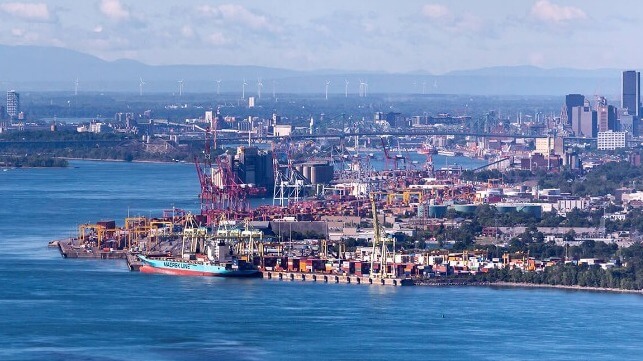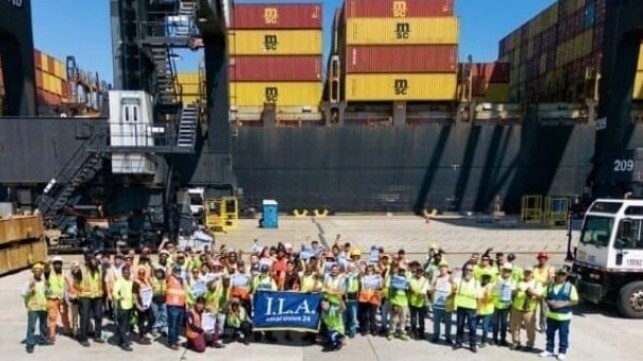Canadian Unions Plan Court Challenges to Arbitration Ending Port Strikes

The unions representing the foremen for ports in British Columbia and the dockworkers in Montreal both responded angrily to the announcement that the federal government was mandating final and binding arbitration in their contract disputes. Both of the unions are being supported by the broader labor movement in Canada when they said they would seek charter challenges to the decision by Labour Minister Steven MacKinnon.
On the West Coast, where the International Longshore and Warehouse Union Ship & Dock Foremen Local 514 has been locked out since November 4, the union leadership called the government’s decision “an insult” and said it was denying workers’ bargaining rights.
“We will fight this order in the courts. We will fight the arbitrated forced contract in the courts,” said Frank Morena, president of the local, in a press release. “Labour Minister Steven MacKinnon has unfairly given the BC Maritime Employers Association (BCMEA) the one-sided federal intervention it wanted from locking out workers and closing BC ports.”
At the same time, the Quebec branch of the Canadian Union of Public Employees (CUPE), which represents the port of Montreal’s nearly 1,200 dockworkers, called it a “dark day for workers’ rights.” In a press release, the union asserted, “The right to collective bargaining is a constitutional right.”
Montreal dockworkers had been striking against two of the large container terminals that had contracts with MSC Mediterranean Shipping Company. On Sunday, members across the port nearly unanimously rejected the “final offer” from the Maritime Employers Association. They were locked out largely closing the Port of Montreal as on Monday.
Both unions said on Tuesday that they planned to file court challenges to the direction by the Labour Minister of the Canada Industrial Relations Board to begin the final arbitration process. MacKinnon said it was clear that there was an impasse in both negotiations and that while the government supports negotiations the strikes were now having broader repercussions on more Canadians.
Labor unions including Teamsters Canada issued statements in support of challenges while businesses expressed relief that a resolution was in reach. Businesses and trade organizations had increasingly been pressuring the federal government to intervene.
With the potential for challenges, activity at the ports has not resumed while the unions and employers were awaiting instructions from CRIB. MacKinnon had said it could be a few days before operations were fully restarted.
The Greater Vancouver Board of Trade posted a calculator on its website to show the impact of the work stoppage including the ports of Vancouver and Prince Rupert as well as smaller Pacific ports. As the lockout passes nine days, they are showing the value of trade disrupted at C$7.2 billion (US$ ). They emphasize this is just trade stopped at the ports and does not reflect the broader economic implications to Canada.
ILA Breaks Off Negotiations Over Automation Issues for East Coast Ports

The tumultuous relationship between the International Longshoremen’s Association and the United States Maritime Alliance (USMX), which represents terminal operators, has taken another turn with the ILA reporting it has broken off the negotiations for a new master contract. Talks resumed this week after a three-day strike in October that closed ports from Maine to Florida and along the U.S. Gulf Coast.
“We are disappointed that USMX would attempt to disregard our ILA’s well-known position opposing job-cutting automation and semi-automation,” said the union in a statement released Wednesday, November 13 after just two days of negotiations.
The ILA is asserting that the employers “continued pushing automation and semi-automation language in its master contract proposals that will eliminate ILA jobs.” The union says USMX introduced new language for semi-automated equipment to be used at the ports.
“Unfortunately, the ILA is insisting on an agreement that would move our industry backward by restricting future use of technology that has existed in some of our ports for nearly two decades – making it impossible to evolve to meet the nation’s future supply chain demands,” USMX responded. They acknowledged that while making progress on other issues, “we were unable to make significant progress on our discussions that focused on a range of technology issues.”
The employers insist that they are not seeking technology that would eliminate jobs, but that the terminals need continued modernization. They said the focus is on increased efficiency, worker safety, and increased capacity. Previously, USMX offered to maintain the existing language in the contract regarding automation. This established a committee including the union to review proposed automation. Port officials point out that most of the ports have little or no automation in place today.
The issue of automation was left unresolved when the ILA and USMX reached an agreement to end the strike with a 62 percent wage increase over six years. They agreed to extend the contract till January 15, 2025, to resume negotiations on the remaining issues including automation, healthcare benefits for members and retirees, work jurisdiction, and container royalties.
Union president Harold Dagget told members that they would hold off on accepting the wage increase because he contends that would require signing a no-strike clause. The ILA called on USMX in today’s statement to “alter its unwinnable strategy, and resume negotiations as soon as possible.”
The January 15 contract expiration is just five days before the U.S. presidential inauguration setting the potential stage for a longshore strike at the start of the new Trump administration. The Biden administration was supportive of the union and pressured the employers to increase the wage offer. Dagget says that President-elect Donald Trump “promised to support the ILA in its opposition to automated terminals.”
Experts point out a January strike would come at a less critical time for the economy as it is a traditionally slower period for retail sales. However, the ports collectively handle half of U.S. volumes. In addition to containers, Ro-Ro traffic including cars and farm and construction equipment would be impacted.
The ILA broke off talks with USMX in June 2024 refusing to start the master contract negotiations and instead preparing for the October strike. Union leaders assert that the membership still stands behind them in the fight over automation creating the strong potential for a second strike.
No comments:
Post a Comment